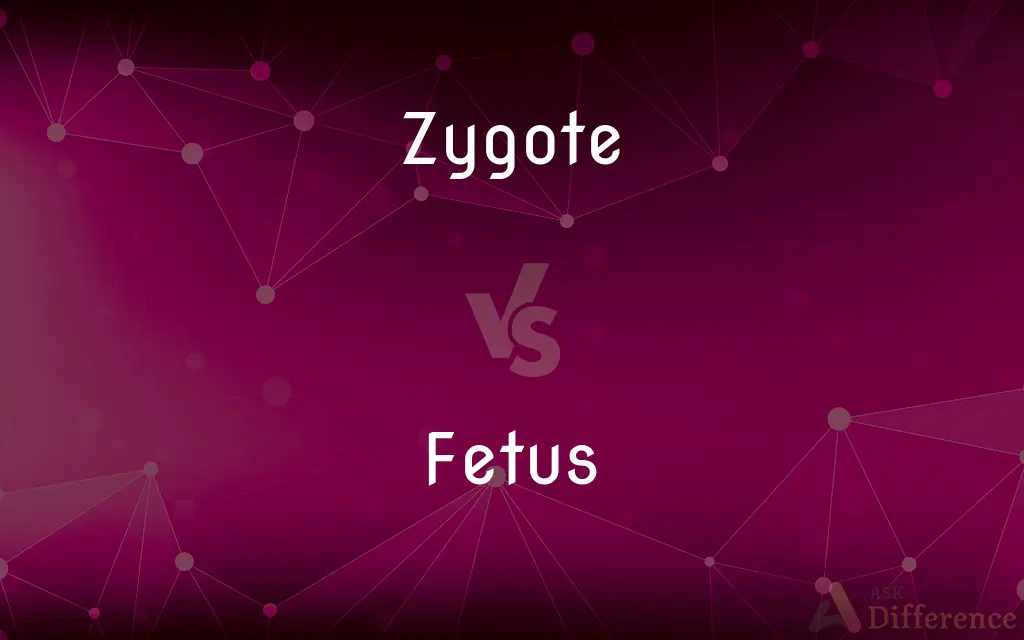Zygote vs. Fetus — What's the Difference?
By Tayyaba Rehman & Urooj Arif — Updated on April 18, 2024
Zygotes are the initial stage of development post-fertilization, consisting of a single cell; fetuses represent a later developmental stage, having differentiated organs and structures.

Difference Between Zygote and Fetus
Table of Contents
ADVERTISEMENT
Key Differences
A zygote forms immediately after the sperm fertilizes the egg, comprising just one cell, whereas a fetus is a later stage in human development, characterized by the presence of distinct organs and a more defined human shape.
The zygote stage is critical for the genetic combination of DNA from both parents, which determines all future biological characteristics, while the fetus stage primarily involves growth and maturation of structures already established.
Zygotes undergo rapid cellular divisions known as cleavage, leading to the formation of a multi-cellular embryo, whereas the fetal stage sees the development of functional systems like the circulatory, respiratory, and nervous systems.
The transition from a zygote to a fetus involves several stages, starting from the zygote, progressing to an embryo, and finally becoming a fetus, which continues to develop until birth.
While the zygote is primarily defined by cellular division and initial genetic expression, the fetus is focused on substantial growth, gaining weight, and final preparations for survival outside the womb.
ADVERTISEMENT
Comparison Chart
Definition
A single-celled stage post-fertilization.
A later stage with developed body organs.
Size
Microscopic, less than 0.2 mm.
Up to 50 cm in length at the end of pregnancy.
Development Stage
Initial stage, involves cell division.
Advanced stage, involves organ function.
Duration
Brief, lasting only about 5-7 days.
Extends from the 9th week to birth.
Dependency
Totally dependent on cellular processes for differentiation.
Partially functional systems, more distinct human features.
Compare with Definitions
Zygote
A zygote is the earliest developmental stage of a human embryo.
The zygote forms shortly after the egg and sperm unite.
Fetus
A fetus is a developing human from roughly eight weeks after fertilization until birth.
During the fetal stage, the human develops recognizable features.
Zygote
The life of a zygote marks the beginning of pregnancy.
Detection of a zygote is a key early indicator in pregnancy tests.
Fetus
The fetus moves and responds to external stimuli by the second trimester.
Pregnant mothers often feel fetal movements starting around the 20th week.
Zygote
Zygotes are formed within the fallopian tubes.
After fertilization occurs in the fallopian tubes, the zygote travels towards the uterus.
Fetus
The fetus develops organs and bodily systems that will function independently after birth.
By the third trimester, the fetus has a fully developed brain.
Zygote
Zygotes are characterized by a single cell containing combined genetic information from both parents.
The genetic makeup of the zygote determines all of the individual's biological traits.
Fetus
Fetuses grow significantly in size and weight during gestation.
The fetus gains the majority of its weight in the last trimester.
Zygote
A zygote undergoes rapid cellular divisions to become an embryo.
From a zygote, the embryo begins to form through a process called cleavage.
Fetus
The health of a fetus is closely monitored via ultrasound.
Ultrasound scans help assess fetal development and detect abnormalities.
Zygote
A zygote (from Greek ζυγωτός zygōtos "joined" or "yoked", from ζυγοῦν zygoun "to join" or "to yoke") is a eukaryotic cell formed by a fertilization event between two gametes. The zygote's genome is a combination of the DNA in each gamete, and contains all of the genetic information necessary to form a new individual.
Fetus
|Image = Human Fetus2.jpg |Image_caption = Foetus A fetus or foetus (; plural fetuses, feti, foetuses, or foeti) is the unborn offspring of an animal that develops from an embryo. Following embryonic development the fetal stage of development takes place.
Zygote
The cell formed by the union of two gametes, especially a fertilized ovum before cleavage.
Fetus
The unborn young of a viviparous vertebrate having a basic structural resemblance to the adult animal.
Zygote
The organism that develops from a zygote.
Fetus
In humans, the unborn young from the end of the eighth week after conception to the moment of birth, as distinguished from the earlier embryo.
Zygote
A fertilized egg cell.
Fetus
An unborn or unhatched vertebrate showing signs of the mature animal.
Zygote
The cell resulting from the union of an ovum and a spermatozoon (including the organism that develops from that cell)
Fetus
A human embryo after the eighth week of gestation.
The sequence is: molecules in reproductive systems, then gametes, zygotes, morulas, blastocysts, and then fetuses.
Fetus
The young or embryo of a vertebrate animal in the womb, or in the egg; often restricted to the later stages in the development of viviparous and oviparous animals. showing the main recognizable features of the mature animal, embryo being applied to the earlier stages.
Fetus
An unborn or unhatched vertebrate in the later stages of development showing the main recognizable features of the mature animal
Common Curiosities
What is the main characteristic of a fetus?
The main characteristic of a fetus is the development of distinct organs and the acquisition of a human-like appearance.
How are zygotes and fetuses studied?
Zygotes are studied through microscopic and genetic analysis, while fetuses are typically studied via ultrasound imaging.
What defines a zygote?
A zygote is the initial cell formed when a sperm cell fertilizes an egg cell, containing genetic material from both parents.
What are the major developmental milestones of a fetus?
Major developmental milestones for a fetus include the formation of vital organs, the beginning of heart function, development of limbs, and the ability to move and respond to external stimuli.
When does an embryo become a fetus?
An embryo transitions to a fetus at about the 9th week of pregnancy, when major organs have formed.
How long does the zygote stage last?
The zygote stage lasts for about 5-7 days before it develops into an embryo.
What is the primary function of a zygote?
The primary function of a zygote is to combine genetic material from both parents and begin the process of cell division that leads to embryonic development.
What kind of medical interventions can affect a fetus?
Medical interventions that can affect a fetus include prenatal surgery, medication administered to the mother, and procedures like amniocentesis.
Can a zygote be seen with the naked eye?
No, a zygote is too small to be seen with the naked eye and requires a microscope for observation.
What differentiates the fetal stage from earlier stages of pregnancy?
The fetal stage is differentiated from earlier stages by significant growth, the maturation of bodily systems, and increased movement and activity of the fetus.
When can a zygote be considered viable?
A zygote itself is not considered viable; it must develop into an embryo and then a fetus, which may reach viability typically around 24 weeks of gestation.
How does the size of a zygote compare to a fetus?
A zygote is microscopic, typically around 0.1 to 0.2 mm in diameter, while a fetus can grow up to 50 cm in length by the end of pregnancy.
How is the health of a fetus monitored?
The health of a fetus is typically monitored through routine prenatal care, including ultrasound scans, fetal heart rate monitoring, and maternal health checks.
Do zygotes have any cellular specialization?
No, zygotes do not have cellular specialization. They consist of a single cell that divides to form specialized cells during the embryo stage.
What environmental factors can influence the development of a fetus?
Environmental factors such as nutrition, maternal health, exposure to toxins, and stress levels can significantly influence fetal development.
Share Your Discovery

Previous Comparison
Crass vs. Class
Next Comparison
Coupling vs. RepulsionAuthor Spotlight
Written by
Tayyaba RehmanTayyaba Rehman is a distinguished writer, currently serving as a primary contributor to askdifference.com. As a researcher in semantics and etymology, Tayyaba's passion for the complexity of languages and their distinctions has found a perfect home on the platform. Tayyaba delves into the intricacies of language, distinguishing between commonly confused words and phrases, thereby providing clarity for readers worldwide.
Co-written by
Urooj ArifUrooj is a skilled content writer at Ask Difference, known for her exceptional ability to simplify complex topics into engaging and informative content. With a passion for research and a flair for clear, concise writing, she consistently delivers articles that resonate with our diverse audience.














































